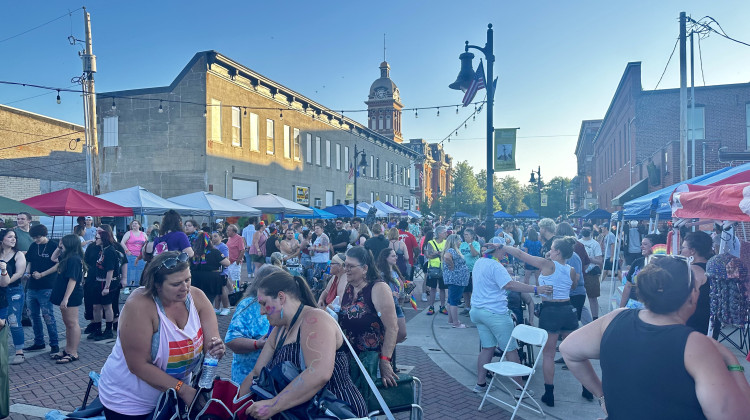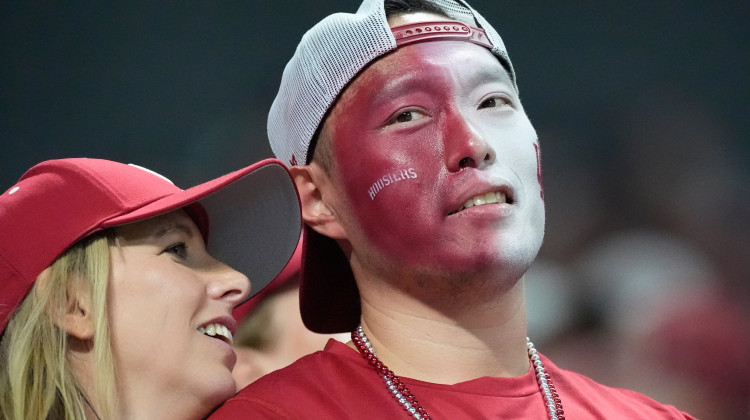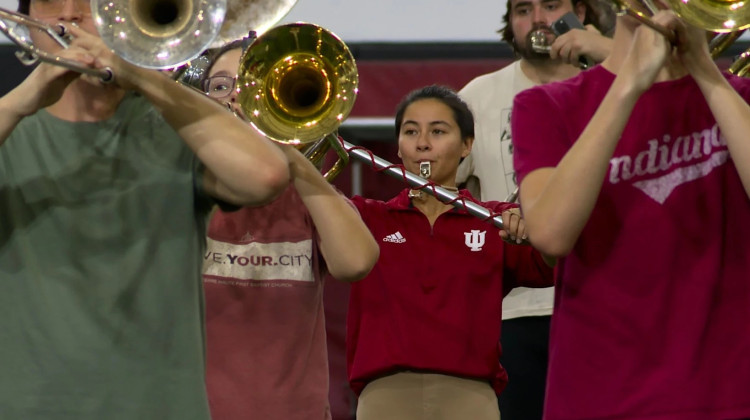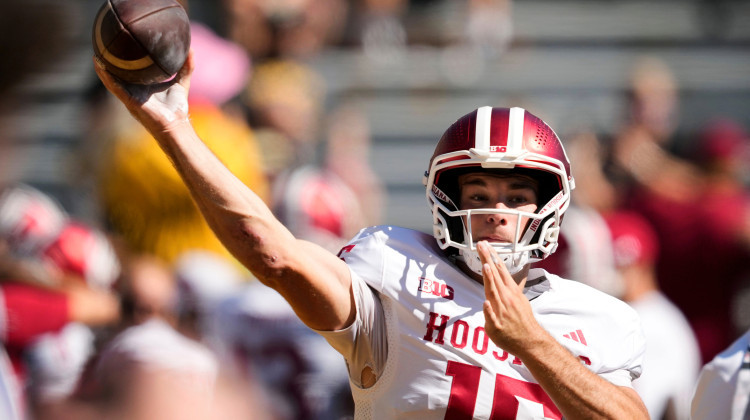Across Indiana, community attitudes toward LGBTQ pride seem to be warming as more communities host events. Even as a wide swath of organizers told WFYI they have seen improvements, some groups report more harassment, wavering sponsors, and local government trouble compared with years past.
Decatur County hosted the final festival of the pride season in Greensburg over the weekend, capping off over 40 pride events in Indiana in 2025.
WFYI sent surveys to the roughly 40 local groups behind pride events statewide. The 20 responses paint a picture of a new landscape: More rural, suburban and urban communities are hosting pride events and seeing local improvements even as pushback becomes more intense in some places. Organizers point to the climate under sweeping policies from the Trump administration and Indiana state government targeting the LGBTQ community.
At least three communities hosted an inaugural event, including the Indianapolis suburb Zionsville and DeKalb County.
Decatur, a city of 10,000 south of Fort Wayne, hosted its first event this year despite protests and threats. The organization endured over a month of community pushback before an estimated 1,000 people showed up at the event, shattering expectations. The small city’s experience highlights several of the themes that emerged from surveys and echoes what some of Indiana’s first open pride events experienced decades ago.
Support is mixed
Each responding community reported varying degrees of challenges. On the whole, they encountered more difficulties organizing this year than in the past, while a handful said they faced no serious concerns.
Among the responses to a WFYI survey of pride organizers, at least:
- 16 (80%) said community attitudes have improved since they began hosting events
- 14 (70%) reported negative or hateful comments aimed at events or LGBTQ people
- 7 (35%) said sponsors requested anonymity or withdrew support
- 7 (35%) reported challenges involving local government, such as permits, venues or political pushback.
Many organizers pointed to two common themes in online harassment.
“This year, we’ve seen an increase in anti-LGBTQ rhetoric online, including more hostile comments about drag performances and trans inclusion,” said Mary Warner, president of Dubois County Pride. “While we haven’t received direct threats, the heightened negativity in public discourse adds to the emotional and logistical burden on our volunteers.”
In some communities, tension crossed from social media into the streets. At least three groups said their events prompted protests this year, while others said they encountered protests in the past.
Fort Wayne Pride, which has hosted an event since 1998, saw an increase in harassment and threats begin last year.
“We had the most protesters at our festival than we have had before, and they stayed for a longer amount of time,” executive director Nikki Fultz said of last year’s events. “We have had a lot of harassment on social media, especially in regards to our all ages, family friendly drag show. We do these every year with a local business and they are well attended.”
At Crawfordsville's first event last year, two protesting groups used loudspeakers and slurs, according to Morgan Vesey, the executive director of Crawfordsville Pride. Police escorted one group away after confrontations. A later dance party was interrupted by a public prayer protest.
Funding also proved fragile. Several groups said some sponsors asked to remain anonymous or withdrew support.
“Some of our long-time sponsors chose to remain anonymous this year,” said Sarah Johnson, president of Southern Indiana Pride in Jeffersonville. “They expressed concerns about potential political backlash or reputational harm to their organizations if they were publicly associated with pride. This underscores a growing atmosphere of fear, even among allies, about openly supporting LGBTQ+ initiatives.”
Southern Indiana Pride is one of seven communities that reported losing sponsors or that had sponsors request anonymity. Many survey responses connected this to the larger political climate.
“While we have many local supporters from businesses, we have found that in 2025 and the changes within the world, we did see a drastic decrease in sponsors from businesses,” said Gunner Hollin, president of Dearborn County Pride.
Signs of increasing acceptance
But it hasn’t all been a challenge. All but four of the responders said that they’ve noticed positive changes since they started hosting events, even as they navigate pushback.
DeKalb County Pride said its first-year event drew little resistance after organizers tailored programming to the local community.
“Being that we’re a small PRIDE organizing in rural areas in Indiana, we tried to make our PRIDE something palatable to most people, as we ease our way into existence,” said Kenny Edholm, the president of the organization. “For this reason, we saw very little, if any, pushback. As we grow, I expect this will change.”
Seymour Pride has experienced discrimination, online harassment, calls to boycott an organizer’s business, and protesters in the past, according to the survey. But leadership said they believe the event makes an impact.
“I believe there have been positive changes as our event has grown considerably, this being our 5th year. I have also had conversations at the last 2 Pride events with people that came with their queer children to see for themselves what is was like, especially drag, and they have told me they were surprised at how positive and loving the event was… it opened their mind and made them feel remorse for being judgemental in the past,” said Kat Hardwick, the president of Jackson County Pride Alliance, which hosts the event.
Fultz, in Fort Wayne, said the “overall climate has improved since our first festival began” in 1998. “This is my 25th year with Fort Wayne Pride and in that time I have seen tremendous growth of the organization as well as much greater acceptance of the LGBTQ community.”
Other survey respondents mentioned that they’ve noticed a perceived increase in support by the local community after organizing for multiple years. They report an increase in attendance, sponsors, or a greater presence of rainbow flags in public spaces.
“There's been a noticeable increase in visibility, conversations, and solidarity around LGBTQ+ issues—particularly those affecting Black and Brown queer and trans people. Our events, protests, and partnerships have sparked deeper engagement from local leaders, organizations, and everyday residents who may not have been involved before,” Indiana Pride of Color in Indianapolis wrote in the survey.
Today’s tensions echo Indiana’s early public pride history
Justice, Inc., helped organize the first open festival on Monument Circle in 1990 after years of mostly private gatherings. The group organized for gay civil rights in Indiana in the 1980s and 90s.
The Celebration on the Circle included over 40 vendor and informational booths and had a lineup of nearly 30 speakers from local and national organizations, including Chris Gonzalez of then-Indianapolis Youth Group, the Rev. Howard Warren of the Damien Center, representatives of the Indiana Civil Liberties Union and the ACLU, Stan Berg of the New Works News, a local LGBTQ+ publication, and David Bird of the Gay/Lesbian Switchboard.
Ruth Peters, a chairwoman of the 1990 Pride Week celebration, told the Indianapolis Star at the time that previous celebrations had been private. “Indiana is one of the few states that has held events that many could not attend,” Peters said. There hadn’t been a public event previously because “no one was willing to organize one.”
The second year, organizers again planned for the event to take place on the Circle, but they encountered pushback from local officials. The officials said that it would cost the city too much in overtime to pay for a police presence on the Circle. Eric S. Evans, an organizer, told the Indianapolis Star that Justice, Inc. had offered to pay for the costs, but the city wouldn’t give them a dollar amount and had previously given permission for other groups to use the space.
The organizers and the city reached a compromise, ending plans from the Indiana Civil Liberties Union to file a lawsuit.
During the event, about 40 protesters tried to overtake the stage until they were surrounded by event supporters. The protesters then marched around the Circle for hours and chanted against the event. One minister dragged around a large cross on wheels.
Mark Lee, an Indianapolis-based photographer who attended early Indianapolis pride events, said the community was dealing with the AIDS epidemic, unexplained murders of gay men, and widespread discrimination.
“I think people are just sick of being in the closet and having to hide,” Lee said. “That was a very visible place, and that made a statement to be on the Circle… Tired of being pushed into the closet and tired of being told that if you’re gay, it means you have AIDS or you’re a pedophile or, you know, all these horrible things that people thought of gay people at the time. Some still do.”
Correction: A photo caption in an earlier version of this story described the city of Decatur's location in Northwest Indiana. Decatur is in Northeast Indiana, and that caption has been corrected.
Contact WFYI data journalist Zak Cassel at zcassel@wfyi.org
 DONATE
DONATE







 Support WFYI. We can't do it without you.
Support WFYI. We can't do it without you.